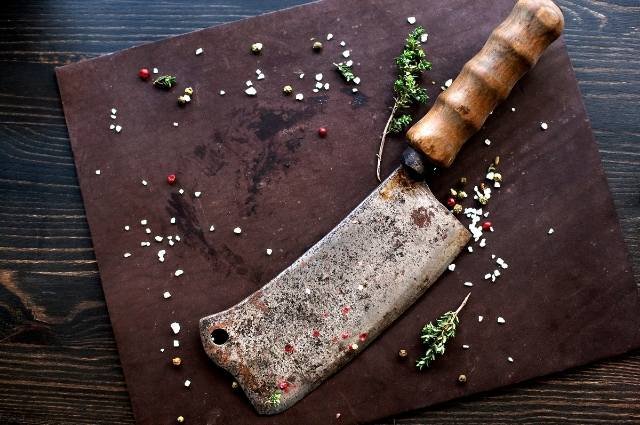Rust spots on kitchen knives are an eyesore and can lead to pitting or corrosion that damages the blade. While no knife is 100% rust-proof, there are several effective ways to prevent unsightly rusting and keep your cutlery looking sharp. With proper knife care and maintenance, you can prolong the life of your knives and avoid the headaches of replacements. Follow these key tips to maintain a flawless, rust-free knife set.
The best way to prevent kitchen knife rust is to hand wash and fully dry knives after each use, store in a knife block or magnetic strip, sharpen blades regularly and apply a protective mineral oil coating 1-2 times per month. Quality stainless steel or high-carbon knives, proper cutting technique, and avoidance of dishwashers also help avoid rust.
Why Do Kitchen Knives Rust?
Kitchen knives rust for a few key reasons:
- Exposure to Moisture – Water and humidity initiate the chemical reaction that causes iron to oxidize into rust. Leaving knives wet or in damp conditions is the primary cause of rust.
- Carbon Steel Composition – Most kitchen knives contain some amount of carbon steel alloy which is more prone to rusting than stainless steel. The higher the carbon content, the easier it will rust.
- Damage to Protective Layer – On stainless steel knives, damage from acids in foods or improper sharpening can wear away the chromium oxide layer that resists rust. This exposes the steel underneath.
- Lack of Proper Maintenance – Allowing residue, dirt, or grime to build up, inadequate drying/oiling, and lack of sharpening can all contribute to rust over time.
- Oxygen Exposure – The oxidization process requires oxygen to occur. Improper storage that doesn’t limit oxygen exposure therefore enables rust formation.
- Environmental Factors – Humid, coastal, and varying temperature environments present more favorable conditions for oxidation and rust to develop.
Regular cleaning, oiling, sharpening, and proper knife storage are key to preventing moisture exposure and damage to protective layers on kitchen knives. Investing in high-quality stainless or rust-resistant knives also helps avoid issues with rust down the line.
How to Keep Kitchen Knives From Rusting?
Here are the details on how to keep the kitchen knife from rusting. Let’s explore.
Choose Knives Made from Rust-Resistant Metals
- Look for knives labeled as “stainless steel” or “high-carbon steel”. These contain metals like chromium and carbon that prevent rusting.
- Avoid knives made from plain “carbon steel”. These have little protection against corrosion and will rust more easily.
- Examine knives closely before purchase. Rust-resistant metals will be listed on the blade or packaging.
Clean Knives Thoroughly After Use
- Use warm water and a small amount of gentle, pH-balanced dish soap. Avoid harsh soaps.
- Gently scrub both sides of the blade, handle, and non-blade portions with a soft sponge or cloth.
- Ensure you remove all visible food bits or juices which can lead to rust.
- Rinse away all soap then hand dry immediately and thoroughly with a clean towel.
Store Knives Properly
- Slotted knife blocks or wall-mounted magnetic strips allow airflow around blades.
- The air exposure means blades dry fastest after washing and are less prone to rust.
- Never store knives loose in drawers or lying on countertops. These trap moisture.
Sharpen Knives Regularly
- Use a whetstone, electric sharpener, or professional sharpening service.
- Sharpen at first signs of dullness, roughly every 3-6 months with regular use.
- Sharpening removes tiny bends in the edge which can collect water droplets.
Apply Protective Mineral Oil
- Use food-grade mineral oil, liquid paraffin oil, or camellia oil.
- Rub a thin coat all over the blade, including the non-sharp sides, with a soft cloth.
- Make sure the oil covers the handle and knife base too to prevent moisture from entering cracks.
- Buff away any excess oil until only a transparent coating remains.

do stainless steel knives rust?
Stainless steel knives can rust, but they are far less prone to rusting than other types of steel knives. Here are some key points about stainless steel knives and rust:
- Stainless steel contains chromium which forms an invisible protective layer that resists corrosion and rust. This makes it very rust-resistant.
- However, the chromium in stainless steel can be damaged by exposure to acidic foods like citrus or tomatoes over time. This removes the protective layer and makes it more susceptible to rust.
- Other factors like damage, improper care, and very wet conditions can also cause the chromium oxide layer to break down.
- Small rust spots may form on stainless steel if it is left wet or in moist conditions for prolonged periods.
- High-quality stainless steel with higher chromium content (18% or more) will be more rust-resistant than cheaper versions.
- Overall, stainless steel is very rust-resistant compared to carbon steel thanks to chromium. But no type of steel is completely immune to rust with improper care.
- Stainless steel knives will stay free of rust with proper washing, immediate drying, oiling, sharpening, and avoidance of dishwashers.
So in summary, stainless steel knives are very rust-resistant but they can develop rust over time without proper care and maintenance. Following good knife care practices is still important for stainless knives.
Also Read:
Is it safe to use rusty knives?
Using rusty knives in the kitchen can be unsafe for a few reasons:
- Tetanus risk – Rust contains iron oxide, which can cause tetanus if it enters the body through a cut or scrape. Tetanus is a serious infection that affects the nervous system.
- Bacteria risk – Rusty knife surfaces can harbor harmful bacteria that can contaminate food and cause illness. Rubbing off rust particles into food is a particular concern.
- Dullness – Rust weakens the integrity of the metal, causing pitting and dulling of the blade edge. A dull knife requires more force to cut, increasing the chances of slippage and injury.
- Transfer of rust to food – Rust can impart a metallic taste, but more concerning is it can leave traces of iron oxide on food that you ingest. Iron toxicity from high levels of ingestion can cause health problems.
- Advancement of rust – If rust is left unchecked, it will continue to eat away at the metal of the blade. It can spread under handles and compromise the full integrity of the knife over time.
For these safety reasons, it’s not recommended to continue using a kitchen knife once rust spots appear. Light rust can sometimes be removed with metal polish and re-oiling. But heavily rusted knives should be discarded and replaced. Investing in quality knives and proper knife care can prevent rust from occurring in the first place.
FAQ on How to Keep Kitchen Knives From Rusting?
What causes kitchen knives to rust?
Exposure to moisture and improper drying are the main causes of kitchen knife rust. Food residues also promote rust by reacting with the metal.
What are the best kitchen knife materials to prevent rust?
Stainless steel and high-carbon steel are most rust-resistant. Ceramic and carbon steel knives are more prone to rusting.
How often should you oil kitchen knives to prevent rust?
Oiling kitchen knives every 1-2 months with mineral oil or camellia oil provides a protective barrier against moisture and rust.
How do you remove rust from kitchen knives?
Use very fine grit sandpaper or steel wool to gently rub out rust spots before re-oiling the blade. Avoid abrasives that will scratch.
Can you reverse rust damage on kitchen knives?
If caught early, light rusting can be removed. But deep pits and corrosion from advancing rust cannot be reversed.
Should you use stainless, high-carbon, or ceramic kitchen knives if you want to prevent rust?
Stainless or high-carbon is best for rust prevention. Ceramic provides no rust protection.
Do kitchen knife sets usually include knives prone to rusting?
Quality knife sets typically feature rust-resistant stainless or high-carbon blades. Lower-cost sets may contain carbon steel prone to rust.
What’s the best way to store kitchen knives to avoid rust?
Store in a knife block or on a magnetic strip to allow proper air circulation. Avoid drawers or loose storage.
How does proper knife sharpening help avoid rust?
Sharpening creates a smoother edge that is less prone to microscopic dings that allow moisture to start rusting.
How does handwashing vs. dishwasher cleaning affect rusting?
The harsh heat and detergent of dishwashers remove protective oils and promote rust. Gentle handwashing prevents this.
How can you spot early signs of rust on kitchen knives?
Look for small discolored dots or patches, orange staining, or a rough texture developing on the blade.
What climate conditions cause kitchen knives to rust more quickly?
Wet, humid environments near oceans and lakes promote rust. Cold, dry climates are less problematic.
Can you prevent wooden kitchen knife handles from drying out and splitting?
Yes, occasionally rub mineral oil into the handles to keep the wood from drying out, cracking, and splitting over time.

Final Thoughts
Properly caring for your kitchen knives is key to preventing the annoying and potentially hazardous issue of rust. Invest in quality stainless, high-carbon, or ceramic knives that are rust-resistant. Be diligent about fully drying and properly storing your knives after each use. Sharpen blades regularly to keep edges smooth.
Apply a protective mineral oil coating periodically. Avoid submerging knives in water or putting them in dishwashers which strips away rust inhibitors. With the right knives and conscientious care, you can keep your cutlery looking pristine and rust-free for years of reliable usage. Implementing these best practices will maintain both the functionality and appearance of your knife set.
Recent Posts
All-purpose chef's knives, cook's knives, and other kitchen knives used daily for meal prepping fill overlapping roles of slicing, dicing, and chopping ingredients. However, the precise differences...
Bread knives have prongs to prevent the bread's soft interior from compressing downwards when sliced. As the knife presses down, the prongs allow pockets of air to escape sideways instead of getting...
